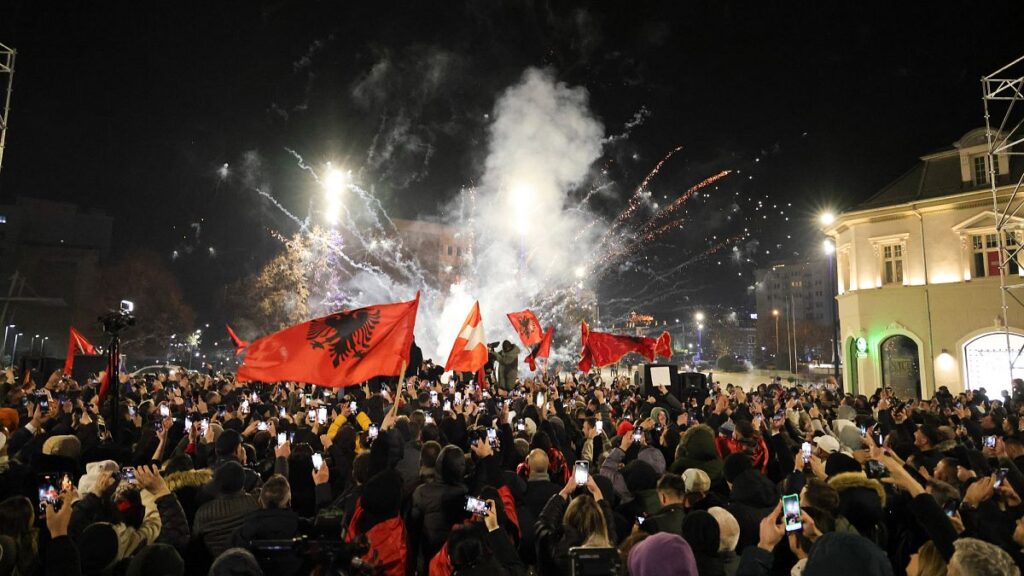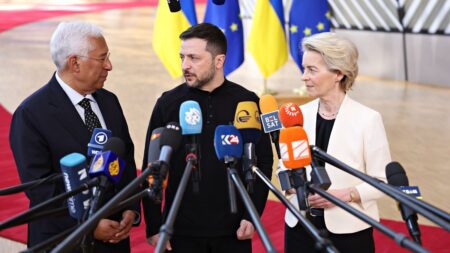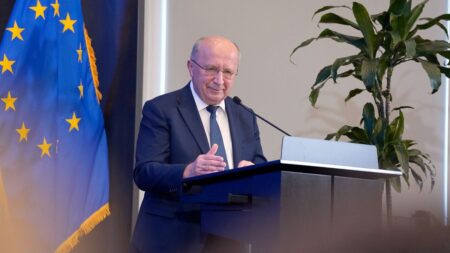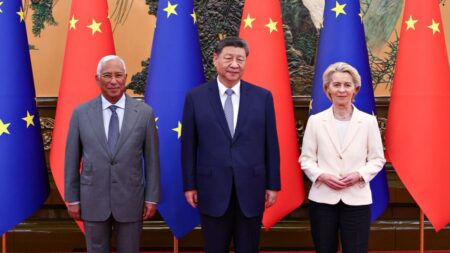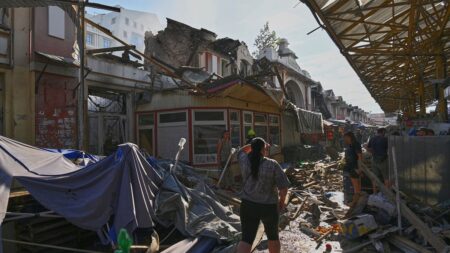Representatives of civil society groups in Kosovo have protested the ongoing blockade of parliament by staging a symbolic demonstration in front of the building in Pristina.
The demonstration took place an hour before the 22nd failed attempt for the newly elected Parliament to convene.
Symbolic clocks were erected at the protest, which, according to the organisers, symbolise the time lost since 9 February, the day of the elections and the start of the institutional formation talks.
According to Eugen Cakoli, from the Kosovo Democratic Institute (KDI), protesting against the “normalisation of the institutional crisis” was the goal of the demonstration.
“Most MPs choose to ignore the alarm that has been ringing for months. Every political party is equally accountable for the Assembly’s dysfunction,” Cakoli stated.
After the parliamentary elections of 9 February, Kosovo still does not have an assembly, something political analysts say raises questions of legality over the activities of the acting government, which is functioning under a technical mandate.
Prime Minister Albin Kurti and a dozen of his ministers, in addition to having already taken the parliamentary oath, have been carrying out their functions in government.
At the protest on Tuesday, alarms were sent off simultaneously to highlight how urgent it is to resolve the institutional problem.
“Every delay has a price!” and “Circus of Democracy” were among the slogans displayed on 120 empty chairs that were set in front of the parliament in the order that they would be seated in the Assembly.
“We filed 17 criminal charges against Prime Minister Albin Kurti and former ministers of his cabinet,” said opposition politician Hikmete Bajrami, from the Democratic Alliance of Kosovo.
“All of them are elected MPs and their mandates were certified by the Central Election Commission according to the official results. So, we consider and believe that since 27 March, they have been violating Article 26 of the government law,” explained Bajrami.
How legal is Kurti’s technical mandate?
Although Prime Minister Albin Kurti and members of his cabinet resigned from their executive positions ahead of the swearing-in of deputies, many argue that, according to the law, members of the government could not remain under a technical mandate.
In April, Kosovo’s legislature swore in the 120 lawmakers in Parliament, after procedural disputes between the political parties, but failed twice to elect a new speaker, a process that’s now taking the country into a prolonged legislative crisis
All parties that won seats in the 9 February election voted unanimously in favour of taking up their mandates, opening the way to the election of the new speaker and deputy speakers.
Albin Kurti’s Self-Determination Movement continues to govern, with Kurti as acting prime minister.
“Kosovo has a government, and I am acting as prime minister. What is missing in Kosovo is a new Assembly of the Republic,” he told local media in an interview earlier this month.
However, under the technical mandate in which the current MPs sit, the government continues to make strategic decisions.
“The normal situation would be that they did not take the oath of parliament at all, but that they continued to perform their duties in the executive branch and that later, depending on whether they would form a government or not, they would change seats in the parliament,” says Serbian academic Aleksandar Rapajić, from the Centre for Advocacy of Democratic Culture.
His position was also shared by Bljerina Istrefi from the Group for Legal and Political Studies, who believes the current parliament impasse has brought about an illegal situation at the executive level.
“A total of 17 decisions were made by the prime minister and ministers at government meetings, in violation of Article 72 of the Constitution, and were presented and were part of the decision-making process,” says Istrefi.
“This means that each of these decisions is illegal because it was made by a working executive in violation of the highest legal act,” she said.
Apart from the fact that all decisions made by the current government in Pristina must be annulled, this way of working is an abuse of official position and authority and is punishable under Article 414 of the Criminal Code of Kosovo, concluded the Group for Legal and Political Studies.
Civil society organisations in the country have vowed to continue to protest against this until the ninth legislature is convened.
Kurti’s Vetevendosje! party won 48 out of 120 seats, falling short of the majority needed to form a cabinet on its own.
A new cabinet would be required to manage the nation’s economy and deal with lingering diplomatic issues, which include continuing the 14-year-old normalisation talks with Serbia, which have not advanced as tensions between the two countries increase.
Kurti and the three major opposition parties, however, have all rejected forming a partnership.
Read the full article here







